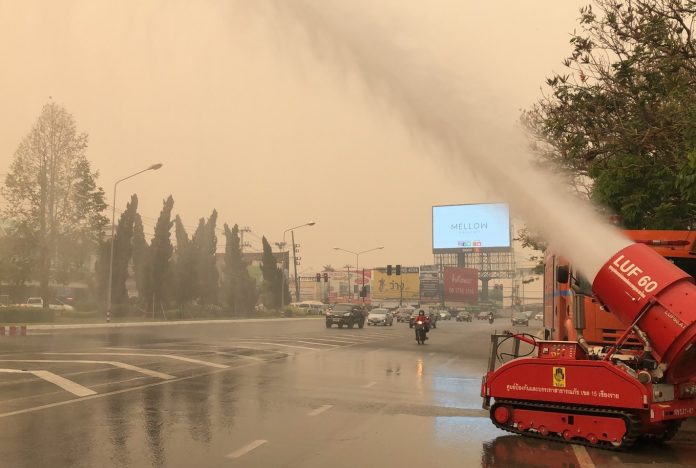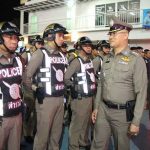The air hanging over Thailand’s far north has become so polluted, the prime minister went Tuesday to see in person what’s been called a severe health crisis.
Junta leader Prayuth Chan-ocha arrived by helicopter at an army base in Chiang Mai, a city that’s a popular tourist destination where seasonal haze has been unusually bad and prolonged this year.
Usually the pollution has been blamed on the burning of forests in neighboring Myanmar. Adding to the problem this year are wildfires caused by a drier-than-usual dry season as well as Thai farmers and hunters clearing land.
Prayuth handed out firefighting supplies like hoes and told local military personnel and firefighters that he traveled to Chiang Mai because he wanted to show his support. He’ll later meet with local officials to discuss budgets and other issues related to combatting the smog.
Standard measurements of Chiang Mai’s air quality have soared way in the danger zone and remained there for many weeks. Once such measurement, PM2.5, refers to airborne fine particulates 2.5 microns or less in diameter that are small enough to be sucked deep into the lungs and enter the bloodstream. High PM2.5 levels indicate pollution that is severe enough to cause respiratory problems and that over time may raise risks of cardiovascular disease and cancers.
Thailand’s official safety limit is 50 micrograms of PM2.5 per cubic meter of air, higher than that suggested by the United Nations.
In recent weeks in the north, the levels have regularly been reaching four to six times the Thai safety limit, and in one case peaked at 700 mcg.
Local news reports have described efforts to get face masks to Chiang Mai residents that are capable of filtering out PM2.5 matter. A school posted photos of air cleaners installed in the building. Officials expect foreign tourists to continue traveling there but worry domestic tourists may avoid the north during Thailand’s new year holidays in mid-April.
Khuanchai Supparatpinyo, director of the Research Institute of Health Sciences at Chiang Mai University, told The Associated Press that Chiang Mai province has for over a decade has endured an annual phenomenon its locals dub “dust season.”
The city, popular with tourists, is especially vulnerable because it is surrounded by mountains that trap the pollution.
The smog that usually hits from February to March accumulates due to Chiang Mai city’s vehicular traffic, agricultural burning and forest fires.
Khuanchai said in recent years, “dust season” can last up to five months due to worsening conditions such as drier air and industrial farming.
In January, more than 400 schools in the capital, Bangkok, were shut for a week when the PM2.5 level was around 70 to 120 mcg. Bangkok’s governor responded by declaring the city a “pollution control zone,” allowing measures such as road closings and limits on diesel exhaust, outdoor burning and construction activities.
Air quality in Bangkok, Thailand’s largest city, has been mostly measured at moderate levels since then, a concern mainly for people with sensitivities such as existing lung conditions.




